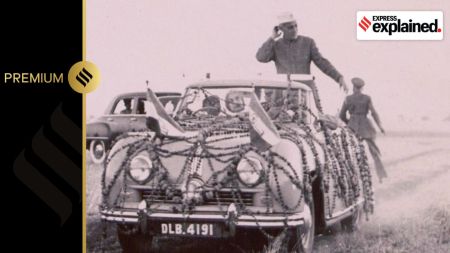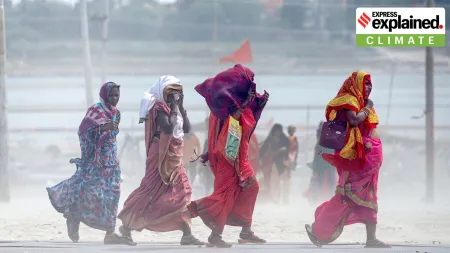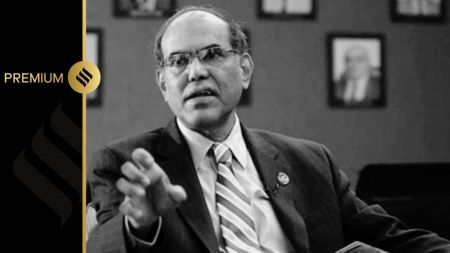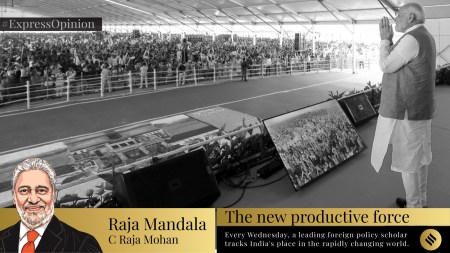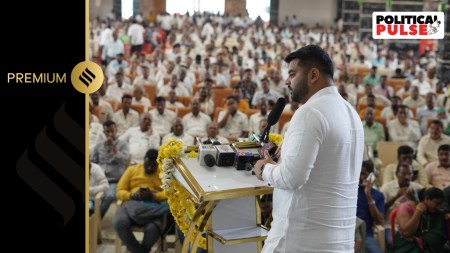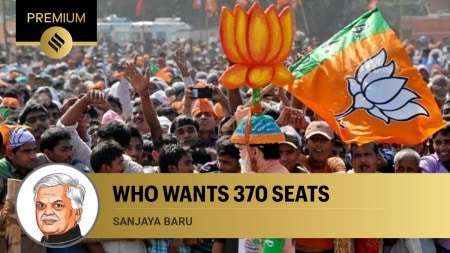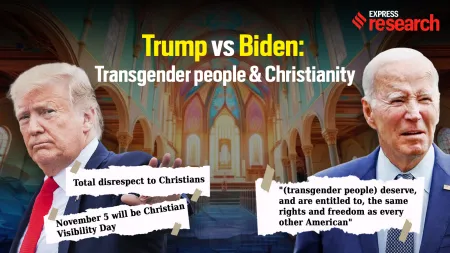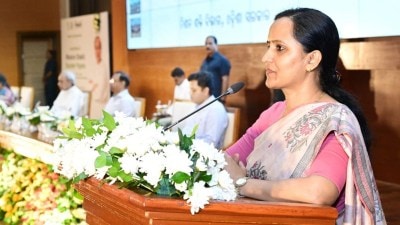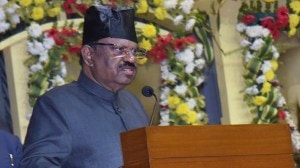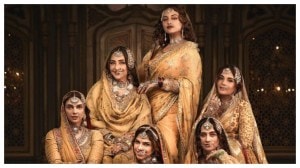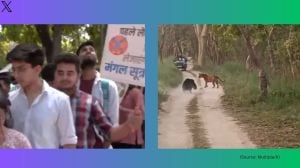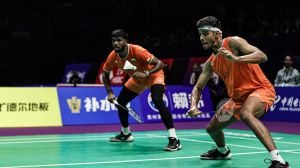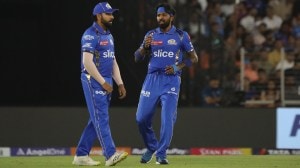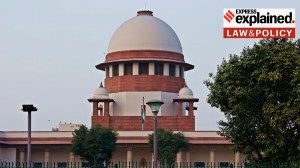- India
- International
Shashi Tharoor at Idea Exchange: ‘For Congress to regain its national image, it would have to make the point to Opposition parties’
Thiruvananthapuram MP Shashi Tharoor’s standing as a leader within and outside the Congress rose substantially after he managed to punch above his weight in the party’s presidential election in October against Mallikarjun Kharge, who had the support of the powerful All India Congress Committee (AICC) establishment.
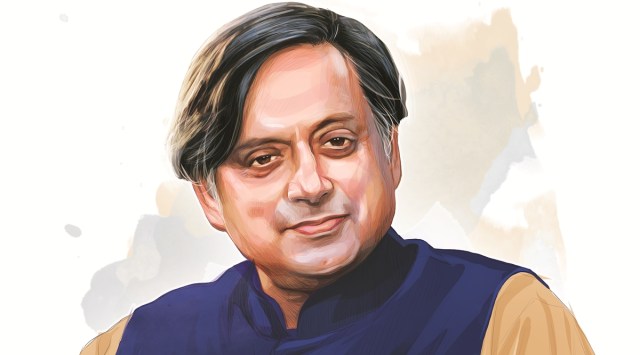
In this Idea Exchange, Congress MP Shashi Tharoor speaks on why the BJP might have overreached in the Rahul Gandhi political row, the opportunity it has created for an united resistance from the Opposition and the road ahead for the Congress. The session was moderated by Deputy Political Editor Liz Mathew
LIZ MATHEW: Recently, with whatever that’s been happening (Rahul Gandhi’s conviction in a defamation case and subsequent disqualification from the Parliament), you said that it is the BJP’s self goal. What made you say so?
There are a couple of unintended consequences that the BJP has found itself dealing with, which, frankly, they may not have entirely expected. One is the fact that there’s been a tremendous reaction from the Opposition, where several parties — particularly regional parties who have traditionally seen the Congress as their rival in their states — have unanimously come forward and supported the Congress and Rahul Gandhi in this particular episode. One of them, the Chief Minister of Kerala, Pinarayi Vijayan, was a genuine surprise. His party said we’re not supporting the Congress, but we’re defending democracy, which is fine because that is exactly the way that many in the Congress would like the Opposition parties to see this issue. It’s about defending our democracy and the Opposition parties’ right to have a level playing field and preventing the misuse of autonomous institutions, including the judiciary, in this case, to settle political scores.
The second is that in many ways, what we’re seeing in terms of public sympathy — I’ve been in Kerala from the very next day of this development — is that the public has become very sympathetic to Rahul Gandhi. When I ask people who are not known to be Congress supporters, tell me is it good for democracy in our country if the principal leader of a major Opposition party is locked up for two years, not allowed to appear in Parliament and not have his voice heard? Unanimously, even people who voted for the BJP last time are saying that this is not good. The BJP may have gone a bit too far in terms of their overreach.
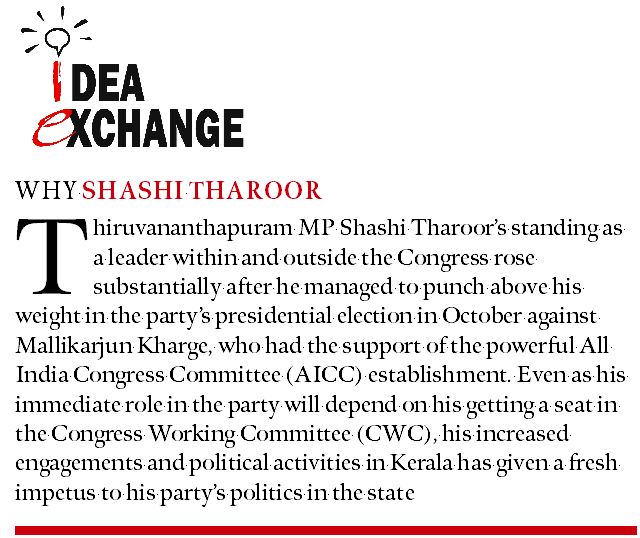
LIZ MATHEW: Can we expect the sympathy that you speak of towards the north, which is more important in an electoral game? Do you think that would transform into votes against the BJP and in favour of any party which would stand against the BJP?

That remains to be seen. But I think we need to make it very clear that in this particular instance, the government has done something which honestly is reprehensible. Therefore, instead of the BJP gloating about this, they should have taken a very different approach. I said on television a few days ago that if I were advising the BJP, I would have said they should appeal to the court to give him a less severe sentence to show that they’re not trying to silence him. Instead, we’re seeing the BJP MPs and ministers gloating about Gandhi’s discomfiture. People point out that it’s almost impossible to find an example of a criminal defamation case creating a situation where the person found guilty got the maximum sentence. You’re giving somebody the maximum punishment, that too for a statement that clearly lends itself to at least two possible interpretations. You’re doing so because that maximum sentence happens to be the minimum sentence required to disqualify him from Parliament. The real issue is the vote in northern India because, in the south, the BJP doesn’t have traction anywhere, except in Karnataka. Everything I’m hearing suggests that in Karnataka they’re about to meet their Waterloo.
What (Rahul) Gandhi was saying is that if India… starts slipping down the slippery slope of converting into … an electoral autocracy, that would certainly not do India and the global case for democracy any good
If you look at the north, we will have to make the campaigning effort to convert a genuine level of public and intellectual sympathy for our predicament into votes. It helps when the other Opposition parties are sympathetic because one of the key tools for this would be if the result of the sympathy publicly expressed by Opposition parties is a greater willingness to get on a common platform. The ruling party won the 2019 elections with just 37 per cent of the vote and still won more than 60 per cent of the seats. The rest of the vote went to 35 victorious parties, all represented in the current Parliament. But if many, if not a majority of the parties, could now find a new reason to come together and stop dividing each other’s votes, the BJP might genuinely find it much harder to win a majority in 2024. I’ve read the cynical theory that the BJP doesn’t mind that, what we’re seeing now is an elaborate game meant to build up Rahul Gandhi as the principal challenger, thereby turning 2024 into a Modi versus Rahul election that the BJP can win. But I would say building up a major rival is also an extremely high-risk strategy. It’s like you’ve got everything going for you and you do something that shoots yourself in the foot. If the result so far has been to put a halo on Gandhi and to unite a fractious divided Opposition, then surely this is an own goal.
LIZ MATHEW:You’ve been invited for lectures to the UK many times. You argued about how the Britishers looted India, but your leader spoke about the present dispensation and its follies as far as democracy is concerned. Do you agree with the criticism that he should have spoken of such things in India and made a different presentation there?
No, because he chose his words very carefully. He actually said, number one, this is an internal problem. It’s one that we have to solve ourselves. Secondly, when he mentioned democracy, he didn’t ever say, your country should do something about our democracy. He said, it’s our problem, we’ll solve it because Indian democracy is a global public good. That’s a very valid proposition, because our democracy is indeed something that sustains the credentials of democracies worldwide. For the longest time, we were a poster child for a shining democracy in a world in which the rise of China and the continued autocracy in Russia had given a real challenge to the Western notion that the end of history had witnessed the triumph of liberal democracy. What Gandhi was saying is that if India ceases to be that or if it starts slipping down the slippery slope of converting into, not a democracy, but an electoral autocracy, that would certainly not do India and the global case for democracy any good. I think that’s a subtle, fairly sophisticated argument. It wasn’t as it’s being portrayed: as a crude attack on India in a foreign country. I don’t think that he can be accused of having done that.
P VAIDYANATHAN IYER: What do you see for the Congress as a challenge to mobilise support among people at large across the country? If this is a democratic backsliding, the highlight being Gandhi’s disqualification and other issues which most Opposition parties are talking about, how does Congress see it as taking it to the ground as a big protest leading up to the elections in 2024?
We need to get the Opposition parties to agree on a common minimum stand on these issues. I hope that process is on after the very welcome statements by the Opposition parties. If I were in a position, and I am not, to identify those elements for the strategists, I would say that we should be concentrating on the economic conditions of people. We need to ask people, has this government helped you in your lives? Is your life better off? I suspect the answer would be not so great. A lot of people, this may be partially just the urban elite, are perturbed about these dramatic, visible and audible erosion of our secularism. Maybe secularism is the wrong word. Just the fact that we all used to live together, get along together, play cricket together and now we’re demonising one minority in particular and perhaps, in due course, all minorities. We do need, at least for the educated public, to also talk about the erosion of institutional autonomy. It’s dramatic the way in which so many previously autonomous institutions, from the Election Commission to the free press to the judiciary, all seem to be compromised into supporting the government’s line. The last time that a government played roughshod with our democracy was during the Emergency. In 1977, they lost the election badly. So, all these are arguments well worth making. But we need to do it in a coherent and cooperative way. We need to stop undercutting each other. A national election is also the sum total of 28 states elections. We can’t afford to just sit and expect all this to happen naturally. There’s got to be a serious organisational effort.
Whether Mr Modi has one degree or two or none has no impact on anybody… What policies he undertakes, what he does to our democracy…, those are the kinds of things that can be held against him
Advertisement
MANOJ CG: When you use strong words like reprehensible, are you suggesting in any way that the government pressured the magistrate into delivering that verdict? About the disqualification, the law of the land is very clear — a lawmaker gets disqualified automatically the moment a two-year sentence is given to him…
There are some curious elements in this case. The gentleman who filed the case was not one of the three Modis named by Gandhi in his speech in Kolar in 2019. The original judge who heard the complaint had said that it didn’t seem to have much substance in it. This actually prompted the petitioner, Purnesh Modi, to rush off to the High Court and win a stay on his own petition, which is a very bizarre development. Then a full two years later, and a few days after Gandhi made his now notoriously expunged speech in Parliament, accusing the Prime Minister of crony capitalism, several things rapidly happened. The judge in Surat was replaced. Purnesh Modi rushed back to the High Court to get his own stay lifted. His case was revived by the new judge, and in just 20-odd days, Rahul Gandhi was not just found guilty, he was awarded the maximum possible sentence, which is extremely rare and unusual in criminal defamation cases. Conveniently enough, this maximum sentence turned out to be the minimum period required to debar an MP from Parliament. Not just for two years, but for a further punitive six years more.
MANOJ CG: You were a minister in UPA-2. How do you look back at the fact that it was Mr Gandhi who sealed his own fate when he stood in the way of the ordinance in 2013 when the Supreme Court altered the previous position that allowed all convicted lawmakers to retain their seats till they’d exhausted all judicial remedies?
I know a lot of people are expressing schadenfreude about this. But the truth is that he took that position on principle and as far as I know, he still stands by that principle. He felt that if somebody was convicted of corruption or any other similar crime meriting a sentence of two years or more, then the government should not have them continue in Parliament. We should just let the process continue and then let the person exonerate themselves. I would be very surprised if merely because he’s been a victim of it, he’s going to change his mind.
I must say that he was standing up for principle at a time when we were very sensitive to the image that the UPA sarkar had earned at that point. With the CAG report and the Anna Hazare movement, there was more and more talk, by 2013, of corruption. For him to take a resolute stand against corruption was politically an astute thing to do. It’s been portrayed very differently now, but you have to look at things in context.
VANDITA MISHRA: In recent days, we’ve heard Arvind Kejriwal launch an attack on PM Modi on his educational qualifications. Do you think that’s politically wise strategy for an Opposition party?
Politics that attacks people for personal traits, qualities, qualifications and so on, is very rarely welcome in any political environment. Unfortunately, everyone does it. And certainly many people in the BJP have done it. These are the kinds of things you can joke about on a WhatsApp group, or you can share messages about, and you may influence minds that way. But to make them a public issue is wrong, because, ultimately, what should matter in any political process is what affects the lives of voters. And, at the end of the day, whether Mr Modi has one degree or two or none, has absolutely no impact on the daily lives of anybody in our country. What policies Mr Modi undertakes, what he does to our democracy, how he conducts his policy, those are the kinds of things that actually can be held against him. Having said that, let me at least grant Mr Kejriwal the point that I think his argument was not just about the qualifications… (it was) about whether an election candidate has misled the public by filing false affidavits in the election. You could argue that that is a legitimate issue to raise, given that the other side would not hesitate to raise such cases if they could disqualify a candidate in that process.
LIZ MATHEW: Everyone is talking about the Opposition coming on to one platform. Will it not be possible for the Congress to regain its pan-India strength?
It’s widely seen that of the 543 seats in Parliament, a little over 200 seats are seats which are a straight fight between the Congress and the BJP. Therefore, by definition, the Congress is the principal opponent of the BJP. It’s the only pan-Indian opponent of the BJP. Even when we did badly in the elections, we got 52 seats in the last Lok Sabha. So, for Congress to regain its national image, it would simply have to make the point to the Opposition parties that we will give way to you in areas where you’re clearly stronger than us, and you must give way to us where we are strong. Even those who have stayed away from the Congress know that there are a couple of 100 seats where the best they can do is be spoilers, because they have no presence, no history, no cadres, no organisational capacity. Sit down with the Opposition, go through the 543 constituencies and see if you can come to a consensus as to who is the most obvious non-BJP challenger in a particular seat. If you do that, we might well find Opposition unity turning out to be a real prospect.
MANOJ CG: After that famous fight against Mr Mallikarjun Kharge for the Congress presidential elections, we saw you travelling across Kerala. Are you planning to move to Kerala politics? Next year, will you be contesting from Thiruvananthapuram again? Secondly, it’s been a month since the Raipur AICC session. There is no CWC in place. The party may be caught in the Rahul Gandhi row, but are you hopeful that Mr Kharge will soon reconstitute the CWC and you’ll find a place in it?
On the first question, all I can say is that I’ve made no decision on any of these larger questions of the future. At this stage, I’m just continuing to be as good a soldier as possible for the party. In terms of my running around Kerala, if it created a space for me or widened the space that I already had, no problem with that. Kerala elections are a little more than three years away. There’s time to make that call. Meanwhile, I’m doing everything required of a Trivandrum MP.
On your second question, normally, the (Congress) Constitution says that the Working Committee will be announced at the AICC plenary session, but a decision was made to entrust that job to the President. It’s now been a little more than five weeks since the plenary and we still don’t have a working committee. You’re quite right in saying that he’s probably had his hands full for the last week with the Rahul Gandhi conviction and its consequences. But we expect that the President will conduct some sort of reorganisation of the top echelons of the party to put his own stamp on the party. Because very clearly, this is no time for complacency. One year away from a national general election, the party has to be geared up and energised for that purpose.
May 03: Latest News
- 01
- 02
- 03
- 04
- 05


